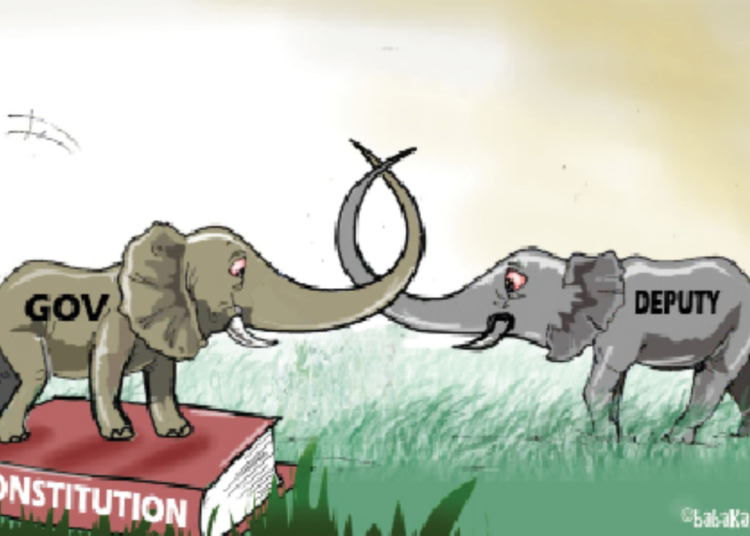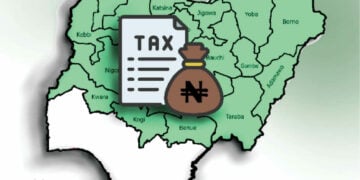That there are frictions between some governors and their deputies cannot be disputed. That the frictions are absolutely unwarranted can also not be disputed. Sadly, this has been the history and reality of state governance since 1999.
Yet, no governor can be elected without a deputy. No governorship ticket is valid unless a deputy governor is on the ticket. A governor can be removed from office for the defects of his deputy as we saw in Bayelsa recently where an elected governor was denied the office because his deputy was found defective in his qualifications.
Clearly, a governor and his deputy are siamese twins, bound together by the 1999 constitution. They are in indeed a union of equals in which divorce is unthinkable.
In many instances, it is the deputy governorship candidate that brings along votes with which many joint tickets win. We saw that in Kogi, we saw that in Zamfara but as soon as the governors of those states settled down, they ousted their deputies.
This has become norm since the restoration of democratic governance in Nigeria in 1999.
This internal strife is often attributed to the lack of clear delineation of roles for deputy governors by the constitution.
Addressing this longstanding problem is crucial as it will foster a harmonious working relationship between governors and their deputies, which in turn will contribute to a more stable and productive democratic system for the benefit of the electorate.
Like Obaseki, Like Akeredolu
The tussle between the governor of Edo State, Godwin Obasaki and his deputy Philip Shuaibu is typical of frosty relationships between these highly placed political leaders. Theirs started when the deputy governor went to court to seek protection from alleged plot by the governor to have him impeached. Following intervention by stakeholders Shuaibu withdrew the matter from court. The withdrawal from court brought him no respite as Governor Obasaki has had the Deputy Governor locked out of his office at Government House.
Shuaibu is not the only deputy governor receiving “wotowoto” in the macabre dance of governors and their deputies. There is another game of swords going on between the Governor of Ondo State Rotimi Akeredolu and his deputy, Lucky Aiyedatiwa.
The rift between Lucky Aiyedatiwa, and Gov Akeredolu, came to the fore when Governor Akeredolu disbanded the media crew attached to the office of his deputy. A statement by the CPS to the governor, Richard Olatunde, noted that all media aides appointed by Akeredolu and seconded to the office of the deputy governor, had been relieved of their appointments with immediate effect. Obviously, the Deputy Governor’s aides were sacked without the Deputy Governor’s knowledge. This can be described as the height of disrespect and disregard to the office of Deputy Governor, equal only to the dishonor dished to Dep Governor Shuaibu who was seen in a video clip practically begging to be let into Benin Governor’s Office. These acts of disrespect undermine democracy as a whole, I hope these cantankerous governors know this.
Chiefs Of Staff More Influential
In many states the Governors’ Chief of Staff and even Secretaries are more powerful than the deputy governors in terms of influence and budgetary approval capacity. These unelected officials often have more authority, more control and more influence than the elected deputy governors. This is an aberration, more so that many of those appointed Chief of Staff in some states cannot win even as councillors. It should be noted that in many states, Chiefs of Staff are often relations of Governors thus turning state administrations as family affairs. This is a situation that the constitution does not envisage nor approve.
In a democracy, the electorate choose their leaders by election. How come unelected appointees are allowed to over rule, over ride elected Deputy Governors? This is certainly not the intent and spirit of democracy.
Some Governors Averse To Succession By Their Deputies
Since the dawn of democracy in 1999, there have been only a handful of deputy governors who successfully stepped up into the governorship seat after their tenures as deputy.
There always seems to be a quarrel which heightens towards the end of the tenure of their joint governorship tickets. The governors often want to single handedly handpick their preferred successors who in most cases are not their deputies.
These same governors would hypocritically campaign for their handpicked candidate asking the electorate to vote for him for ‘continuity.’ If they were sincere, who better to ensure continuity in their administrations than their own deputies!
Governors are also not alone in this hypocrisy. Since 1999, the two occasions when the presidents have served the maximum of eight years, they never wanted their vice presidents to succeed them. In 2007, former president Olusegun Obasanjo did everything to ensure that his vice president Atiku Abubakar did emerge the presidential candidate of the Peoples Democratic Party (PDP).
While in the case of former President Muhammadu Buhari he never showed any inclination of wanting Vice President Yemi Osinbajo to succeed him, yet he wanted continuity of his policies beyond his tenure. Buhari’s proffered choice turned to be Ahmed Lawan much to the chagrin of his vice president with whom he had won a joint ticket 8 years earlier!
Constitutional Dilemma Of Deputy Governors
The apparent subservient position of the deputy governors is largely the fault of the framers of our constitution.
In Chapter 6 section 186-187, the constitution says “There shall be for each State of the Federation a Deputy Governor. In any election to which the foregoing provisions of this part of this Chapter relate, a candidate for the office of Governor of a State shall not be deemed to have been validly nominated for such office unless he nominates another candidate as his associate for his running for the office of Governor, who is to occupy the office of Deputy Governor; and that candidate shall be deemed to have been duly elected to the office of Deputy Governor if the candidate who nominated him is duly elected as Governor in accordance with the said provisions.” This shows that nobody can become governor without a deputy. It is therefore a shared mandate.
It is however in section 193 where dirt was done to deputy governors when the constitution states that “ The Governor of a State may, in his discretion, assign to the Deputy Governor or any Commissioner of the Government of the State responsibility for any business of the Government of that State, including the administration of any department of Government.” In other words, the constitution by the phrase above demoted deputy governors to the rank of commissioners. This is where the governors became the Lords of the Manor.
The Nigerian constitution did not provide precise and comprehensive outline of the roles and responsibilities of deputy governors.
To address the lack of clarity in the roles of deputy governors, legal reforms should be enacted to clearly define their functions. The constitution should outline roles for deputy governors, making it explicit that they are deputies to governors, not appointees of governors who serve at the whim of governors.
The consistent friction between state governors and their deputies in Nigeria is a divisive factor that impedes effective governance and democratic stability.
MAY NIGERIA REBOUND





